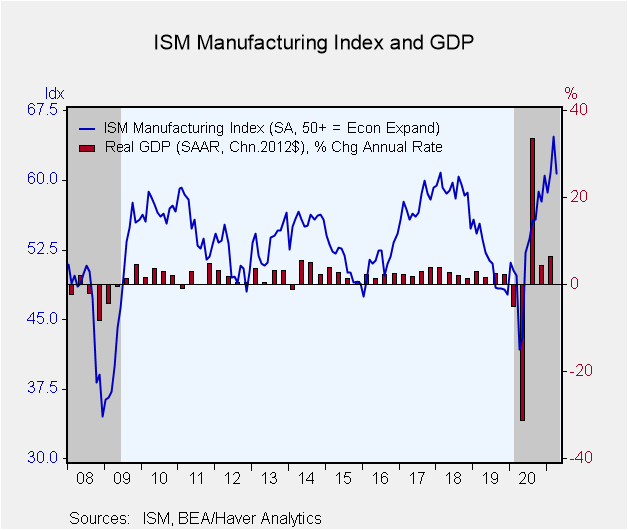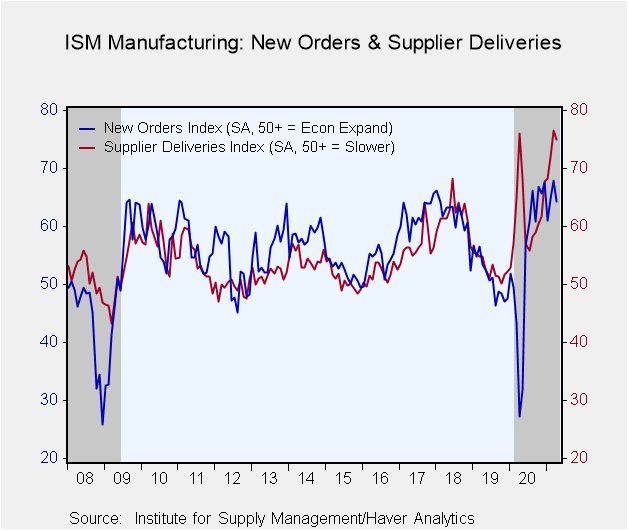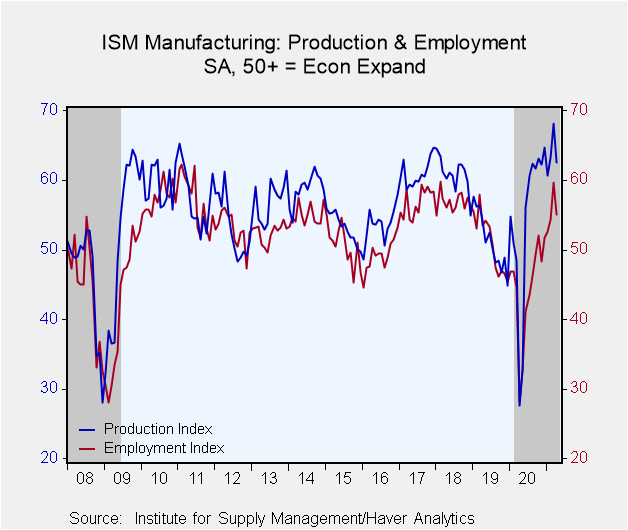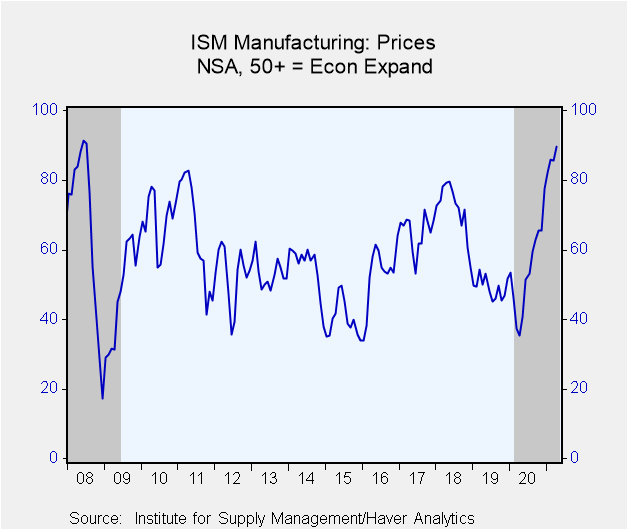 Global| May 03 2021
Global| May 03 2021ISM Manufacturing Index Falters in April
by:Tom Moeller
|in:Economy in Brief
Summary
• Factory activity weakens to lowest level in three months. • Component declines are broad-based. • Pricing power continues to improve. The Institute for Supply Management (ISM) reported that its Composite Index of Manufacturing [...]
• Factory activity weakens to lowest level in three months.
• Component declines are broad-based.
• Pricing power continues to improve.
The Institute for Supply Management (ISM) reported that its Composite Index of Manufacturing Sector Activity weakened to 60.7 during April after strengthening to 64.7 in March, which was the highest index level since December 1983. The reading fell short of expectations for 65.2 in the Action Economics Forecast Survey. During the last 15 years, there has been a 42% correlation between the composite index and the quarterly change in real GDP. Before the recession began, there had been a 67% correlation.
The ISM indicated that "companies and suppliers continue to struggle to meet increasing rates of demand due to coronavirus (COVID-19) impacts limiting availability of parts and materials."
The production index declined to 62.5 from 68.1, which was the highest level since January 2004. A slightly higher 44.3% (NSA) reported higher production while an increased 11.4% reported lower. The new orders index fell to 64.3 from 68.0. The inventories index plunged to 46.5, the lowest level in eight months. The vendor delivery index eased to 75.0 from 76.6, but continued to indicate notably slow product delivery speeds. Fifty-four percent of respondents reported slower delivery speeds while 3.9% reported a quickening.
The employment measure weakened last month to 55.1 from 59.6, though it remained elevated from its April 2020 low of 28.2. A lessened 21.2% (NSA) of respondents reported higher payrolls and a higher 10.9% reported a decline.
Pricing power remained strong. The prices paid index rose to 89.6 (NSA) from 85.6, the highest level since July 2008. A strengthened 80.1% of respondents reported higher prices compared to last April's low of 10%. Reporting price declines were 0.9% of respondents, down from 39.4% in April of last year.
Amongst other series in the ISM report, the order backlog measure strengthened to a record 68.2, up from 37.8 last April. The series dates back to January 1993. The new export order measure rose slightly to a lessened 54.9 from 54.5. The import series declined sharply to 52.2, the lowest level since June of last year.
The ISM figures are based on responses from over 400 manufacturing purchasing executives from 20 industries, which correspond to their contribution to GDP in 50 states. These data are diffusion indexes where a reading above 50 indicates expansion. The figures from the Institute for Supply Management can be found in Haver's USECON database; further detail is found in the SURVEYS database. The expectations number is available in Haver's AS1REPNA database.
| ISM Mfg (SA) | Apr | Mar | Feb | Apr'20 | 2020 | 2019 | 2018 |
|---|---|---|---|---|---|---|---|
| Composite Index | 60.7 | 64.7 | 60.8 | 41.7 | 52.5 | 51.2 | 58.9 |
| New Orders | 64.3 | 68.0 | 64.8 | 27.3 | 54.0 | 51.2 | 61.6 |
| Production | 62.5 | 68.1 | 63.2 | 27.6 | 53.8 | 51.3 | 60.9 |
| Employment | 55.1 | 59.6 | 54.4 | 28.2 | 44.3 | 50.9 | 56.9 |
| Supplier Deliveries | 75.0 | 76.6 | 72.0 | 76.0 | 61.6 | 52.9 | 62.0 |
| Inventories | 46.5 | 50.8 | 49.7 | 49.5 | 48.8 | 49.9 | 52.9 |
| Prices Paid Index (NSA) | 89.6 | 85.6 | 86.0 | 35.3 | 54.0 | 49.1 | 71.7 |
Tom Moeller
AuthorMore in Author Profile »Prior to joining Haver Analytics in 2000, Mr. Moeller worked as the Economist at Chancellor Capital Management from 1985 to 1999. There, he developed comprehensive economic forecasts and interpreted economic data for equity and fixed income portfolio managers. Also at Chancellor, Mr. Moeller worked as an equity analyst and was responsible for researching and rating companies in the economically sensitive automobile and housing industries for investment in Chancellor’s equity portfolio. Prior to joining Chancellor, Mr. Moeller was an Economist at Citibank from 1979 to 1984. He also analyzed pricing behavior in the metals industry for the Council on Wage and Price Stability in Washington, D.C. In 1999, Mr. Moeller received the award for most accurate forecast from the Forecasters' Club of New York. From 1990 to 1992 he was President of the New York Association for Business Economists. Mr. Moeller earned an M.B.A. in Finance from Fordham University, where he graduated in 1987. He holds a Bachelor of Arts in Economics from George Washington University.
More Economy in Brief
 Global| Feb 05 2026
Global| Feb 05 2026Charts of the Week: Balanced Policy, Resilient Data and AI Narratives
by:Andrew Cates










